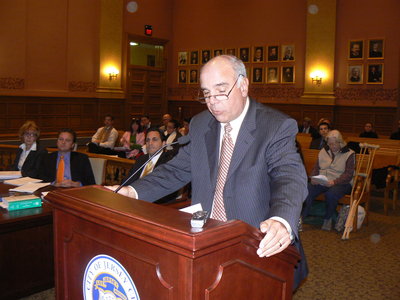The City Council received at their meeting on Wednesday a report meant to improve the city’s development practices, provide more transparency, and stem corruption in the wake of a federal sting operation.
The report came just five months after a federal investigation resulted in the arrests of 44 political and religious leaders statewide, 21 of whom were from Hudson County. The arrests were part of an FBI sting in which informant Solomon Dwek, posing as a developer, met with local officials and offered bribes in exchange for development approvals.
The report was commissioned by the City Council in August after Mayor Jerramiah Healy and his advisors suggested it as a way to overcome conditions that resulted in the arrests.
Fulop called the report “window dressing.”
________
Riccio, a former dean of the Seton Hall Law School, gave a presentation of the report on Wednesday.
The report contains eight recommendations to prevent future Dwek-like situations:
• The city should prepare a guide on development practices and procedures.
• No elected official should privately meet with a developer regarding a project in which the developer has an interest.
• Ethics reform should be initiated, including ethics training, a code of ethics pertaining to the development process, appointment of an ethics compliance officer, and sanctions for those who violate the development ethics code.
• The city should reexamine the master plan. (A master plan is a long-term outline of future development.)
• The city should define the roles of all city offices with any role in development.
• The city should discourage “one on one” meetings between officials and developers.
• Developers should provide extensive background information.
• Meetings of the city’s tax abatement committee should be recorded and made available to the public.
After the presentation, City Councilman Steven Fulop called the report “window dressing” and pointed out that the meetings that led to the arrests were not one-on-one but were with small groups of officials and consultants privately meeting with Dwek.
Before the council meeting, City Councilman Bill Gaughan said he had read the report and agreed with most of the content, but had some reservations.
A copy of the report is available on the website: www.cityofjerseycity.org.
Council delays federal loan to Hilton developer
Also at the council meeting on Wednesday, the council withdrew an ordinance authorizing an $8 million federal loan to the city that would go to the developer of a new Hilton Hotel located in downtown Jersey City. The council wants more assurance that the developer will not default on the loan.
The Section 108 loan, which is issued by the U.S. Department of Housing and Urban Development (HUD), would help finance the construction of the 300-room hotel by Warren, N.J.-based Tramz Hotel on Marin Boulevard. Along with the hotel construction, the $118 million project also would include 470 residential units, an automated garage with 738 spaces, and 12,294 square feet of retail.
A Section 108 loan is a financing tool for economic development projects that benefit low-and-middle income people. The idea is that local blue-collar workers could work at the hotel.
But the default issue is important because the loan is risky for the city. If the developer fails to pay the loan back, the city would have to.
Ironically, the city is required by federal law to pledge, as security, the CDBG (Community Development Block Grant) funding that it receives from HUD to distribute to various social service programs across the city. That means if the developer defaults, HUD would be reimbursed for the amount owed by the city from federal CDBG funds, potentially leaving programs that serve low- and middle-income people underfunded.
Earlier this year, HUD granted the city $1.75 million in CDBG grants.
The council’s concern is that the risk of default is a reality, especially in tough economic times. They withdrew the ordinance based on a discussion at their caucus on Monday, and requested that the developer provide a letter of credit from a financial lender as additional security that it will pay off the loan before the council can vote on authorizing it.
City Councilman Fulop, who represents the area where the hotel will be built, said on Monday that based on conversations with hotel operators in downtown Jersey City, hotel occupancy rates have gone down and that creates a tough market for construction of any new hotels.
But Tarrunumn Murad, CEO of Tramz Hotels, said at Monday’s meeting that while this is a time that hotels have reached their “lowest point,” they are beginning to show signs of picking up and that Jersey City has an upside as a “hub of all new hotels” as opposed to New York City.
Ricardo Kaulessar can be reached at rkaulessar@hudsonreporter.com.
